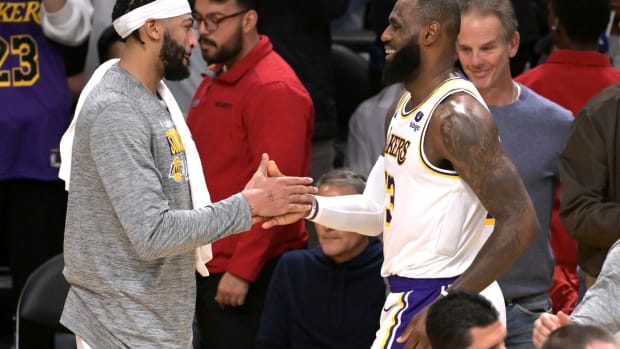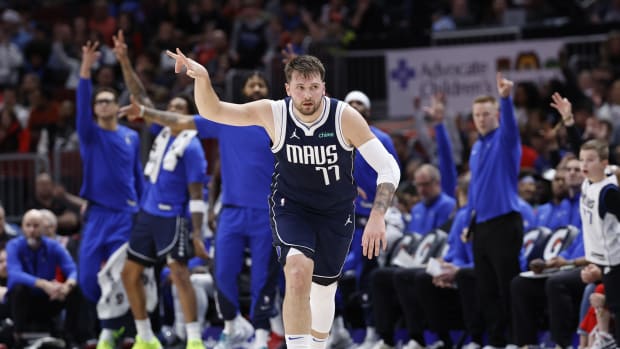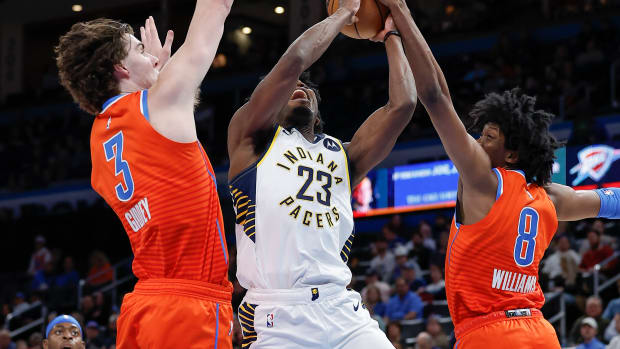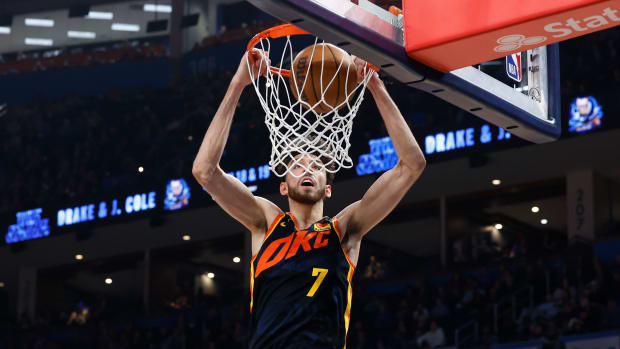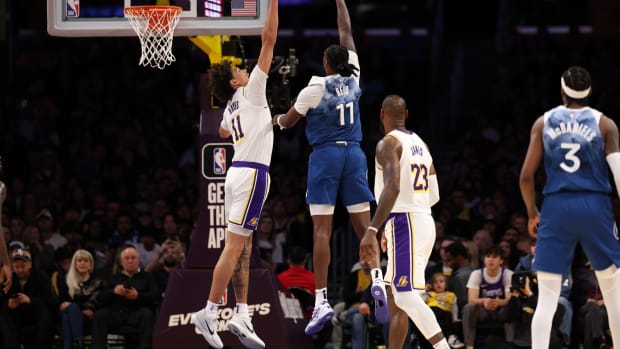Assessing the Mavericks' Workplace Investigation and Placing the Penalties in Context
The NBA on Wednesday announced findings from an investigation into the Dallas Mavericks for sexual harassment and related workplace misconduct. The investigation, commissioned by Mavericks owner Mark Cuban, was made in response to an SI investigative report by Jon Wertheim and Jessica Luther on Feb. 20. Wertheim and Luther revealed a longstanding culture of organizational mistreatment of women and detailed specific allegations against former Mavericks CEO Terdema Ussery, who worked for Mavericks owner Mark Cuban from 2000 to 2015, and Earl Sneed, a Mavericks.com writer from 2010 to 2018. Both men are accused of inappropriate conduct around female employees.
The investigation confirmed Wertheim and Luther’s reporting. The investigation stressed that there were “numerous instances of sexual harassment and other improper workplace conduct within the Mavericks organization over a period spanning more than twenty years” and that Mavericks’ management was “ineffective, including a lack of compliance and internal controls.” In short, the team had failed to take reasonable steps to deter, detect and punish workplace misconduct.
Mark Cuban to Donate $10 Million in Lieu of Fine After NBA's Investigation Into Workplace Misconduct
Cuban, who has owned the Mavericks since 2000, has expressed that he knew nothing about the misconduct and that his entire focus as Mavs owner has been on basketball operations. Some have questioned how Cuban, who in 2011 authored a book titled “How to Win at the Sport of Business: If I Can Do It, You Can Do It” and who portrays himself as heavily involved in the management of his team, could not have known or at least suspected. In fact, one longtime Mavs employee told Wertheim and Luther, “Trust me, Mark knows everything that goes on. Of course Mark knew [about the instances of harassment and assault]. Everyone knew.”
The NBA’s investigation, however, did not find evidence supporting the theory that the 60-year-old billionaire knew of misconduct. “None of the 215 witnesses who were interviewed,” an NBA statement expresses, “stated that they informed Mr. Cuban of Mr. Ussery’s actions, the investigators found no documentary evidence of such a communication, and Mr. Cuban stated that he did not know about the conduct.” Nonetheless, the league concluded that Cuban’s team deserves blame for failing to create a workplace culture and set of human resources procedures that would deter, detect and stop misconduct.
In lieu of a formal punishment, Cuban will donate $10 million to organizations that promote women in leadership roles and that develop policies to combat domestic violence. Under the NBA’s constitution, the maximum the NBA could have fined Cuban was either $1 million or $2.5 million, depending on how the NBA interpreted language in the constitution. For reasons explained below, the league declined to strip draft picks away from the Mavericks.
A thorough investigation
Anytime an organization hires a law firm to investigate itself, there is an inherent conflict of interest. Attorneys are ethically obligated to pursue, and advocate for, the best interests of their clients. In other words, attorneys can’t be neutral on client matters, particularly if the attorneys’ findings portray the client as breaking the law. In this context, attorneys hired by the Mavericks would find it problematic to issue a report that depicts the team and its leadership as engaging in unlawful conduct relating to female employees.
There are also inherent structural limitations in organizational investigations. Investigators may be former prosecutors and retired judges but in private practice they are merely private citizens. They lack subpoena powers and thus can’t compel an employee to turn over his or her texts, non-work-account emails and other communications—a legitimate constraint given the extent to which most of us use our personally owned phones, computers and non-work email systems to conduct a mixture of work and personal matters. In addition, persons who speak with investigators do not go under oath. This presents the risk that witnesses might be more willing to lie, exaggerate or mislead—after all, they needn’t not worry about the prospect of facing criminal perjury charges. For employees concerned about the job implications of admitting to wrongdoing or to pointing the finger at a boss who could fire them, the lack of having to provide sworn testimony is not an insignificant point. Taken together, these structural limitations mean that the investigation into the Mavericks misconduct might not have uncovered the whole truth.
My Story: Melissa Weishaupt Goes on the Record About Mavs’ Culture of Harassment
Despite those caveats, the Mavericks (with the NBA’s blessing) approved an investigatory approach that appears thorough, objective and as complete as reasonably possible. The Mavericks’ investigation was led by Evan Krutoy, a former Manhattan prosecutor who has successfully tried homicide and sex crime cases, and Anne Milgram, a former Attorney General of New Jersey and assistant U.S. Attorney. Both attorneys are from the Northeast and neither has apparent connections to the Mavericks or Cuban. Krutoy and Milgram were also given complete and unfettered access, and were authorized by Cuban to investigate without any cost restraints. In fact, according to their 43-page report, they reviewed 1.6 million documents and “were successful in obtaining emails and documents from 2015 and after (when the current server went into use).” The fact that these two attorneys are employed at different law firms is also significant in that multiple sets of attorneys were involved in the review. The investigation was thus more likely to identify points of concern to the NBA.
Perhaps most tellingly, the NBA was comfortable with the investigation. At any time, the league had the legal authority to launch its own investigation—just like it did when former Los Angeles Clippers owner Donald Sterling was recorded making racist comments. The fact that the league found the Mavericks investigation to be sufficient is a strong endorsement of it.
Cuban accepts blame and pays a high financial price—a price that might grow with victims’ potential lawsuits
Cuban’s willingness to commission a cost-is-no-obstacle investigation was likely not lost on the NBA in its assessment of how to address the Mavericks’ misconduct. Given that the investigation lasted seven months and was led by high-caliber attorneys who likely charge expensive billing rates, Cuban probably spent in the ballpark of $5 million. His response was in some ways the exact opposite of that of Sterling, who aggressively objected to any findings of fault and in fact sued the NBA, along with his wife Shelly Sterling, over the league’s factual conclusions. Cuban and Sterling were also different in that Cuban’s mistakes concerned a lack of oversight of employees’ misconduct whereas Sterling was the person who engaged in misconduct.
The report also delivers a blunt conclusion that will make it easier for victimized former Mavericks employees to sue the Mavericks: the report explicitly substantiates claims that Mavericks executives committed sexual harassment. As a result, any current or pending sexual harassment claims against the team are now more likely to succeed. Cuban, in other words, could end up paying millions of dollars more to resolve potential sexual harassment claims because he spent millions of dollars on an investigation that produced a condemning report.
Also, in an interview with ESPN’s Rachel Nichols on Wednesday, Cuban expressed sorrow and took ultimate responsibility for the harassment that occurred within his organization. In law, such statements can serve as admissions of fault. Taken together, Cuban’s decision to embrace, rather than repel, personal responsibility for conduct committed by his employees probably reflects well on his status with the league. Yet it will likely cost him millions of dollars more than the mere $10 million donation.
The NBA’s penalty in the context of prior penalties
NBA commissioner Adam Silver was in an inherently awkward spot in determining an appropriate penalty. Normally, a professional sports league imposing a $2.5 million fine on a team or owner would constitute an impactful punishment. But a $2.5 million fine levied on a person whose net worth has been estimated around $3.7 billion may not have brought a sufficient effect. This is especially since payment of a fine might qualify as a tax-write off. Given the seriousness of the underlying sexual misconduct, particularly in the context of the #MeToo era, Silver needed to be certain that the penalty would be sufficiently deterring to not only the Mavs but other NBA teams.
The alternative form of punishment would be to take away draft picks from a team. This is a punishment that no amount of an owner’s money can discount. Especially when the stripped draft picks are first-round selections, the taking of draft picks is an especially impactful punishment. Possessing, and smartly using draft picks, are critical to a team’s long-term success. The Mavericks need no reminder of this point: Mavs coaches are said to be elated with their initial impressions of rookie Luka Dončić, whom the Mavericks acquired in a draft-day trade with the Atlanta Hawks. If the NBA had stripped away the Mavericks' first-round pick in the 2018 NBA draft, and thereby made it much more difficult if not impossible to pull off a trade for Dončić, the franchise’s future would be much less promising.
Exclusive: Inside the Corrosive Workplace Culture of the Dallas Mavericks
While vacating draft picks would thus “really” hurt the Mavericks, draft pick penalties have traditionally been reserved for violations of competition and fair play rules. In 2000, then-NBA commissioner David Stern stripped five first-round draft picks away from Minnesota as a punishment for T-Wolvers owner Glen Taylor negotiating a “secret agreement” with free agent forward Joe Smith. The agreement enabled the T-Wolves to circumvent salary cap restrictions. Smith signed to a one-year contract in 1999 worth well-below his market value—which the Timberwolves needed in order to stay under the cap during the 99-00 season—with the promise that team would later sign Smith to multiple future contracts worth $86 million. It was a scheme that would have provided the T-Wolves with an unfair competitive advantage: the team was offering “future” contracts as a way of inducing a player to sign a present-day contract.
A less egregious example of unfair advantage occurred in 2012, when Stern ordered that the Oklahoma City Thunder transfer a second-round pick to the Boston Celtics. The punishment reflected the Thunder failing to adequately reveal medical information about Jeff Green, who missed the entire 2011-12 season for surgery to repair an aortic root aneurysm. Thunder officials failed to inform Celtics general manager Danny Ainge and assistant general manager Mike Zarren when the Thunder traded Green to the Celtics during the 10-11 season.
The Mavericks’ infraction, in contrast, presumably had no tangible impact on whether Dallas won or lost games, or on whether the team gained some sort of competitive advantage over rivals in the Western Conference. A draft pick penalty for sexual misconduct would inelegantly mix sports and workplace matters. It would also punish players, coaches and fans who had nothing to do with the wrongdoing.Yet it might also serve as the most persuasive way to “send a message” that would deter teams from the underlying misconduct.
Silver also knew that his predecessor, Stern, declined to punish the New York Knicks or Isiah Thomas in 2011 after a jury awarded $11.6 million in damages to former Knicks employee Anucha Browne Sanders. Sanders had sued the Knicks and Thomas over allegations that Thomas engaged in different kinds of misconduct, including allegedly calling her a “bitch” and “ho” in private conversations. Before an appellate court reviewed the jury’s verdict, the parties settled. While the Thomas situation is in some regards similar, the types of allegations are different and, perhaps most importantly, they are occurring in different times in American history: the #MeToo movement has raised the importance and accompanying concern for allegations of sexual misconduct.
Ultimately the NBA, with Cuban’s approval, determined that a more substantial monetary punishment than is permitted by the league constitution was appropriate. As detailed below, under the league’s constitution the maximum the NBA could have punished Cuban for misconduct was $1 million; the league could have also insisted that a $2.5 million penalty would have been appropriate under a separate “best interests” clause. The league instead concluded that Cuban donating 4 or 10 times what he could be fined, and donating that amount to causes relevant to the underlying misconduct, would be the most type suitable punishment. Given the drawbacks of the other forms of punishment discussed above, the NBA seemed to reach a logical conclusion.
NBA clearly had legal authority to punish
While there was never any indication that the Mavericks or Cuban would have contested a punishment, if they did they would have found themselves on wobbly legal grounds. The NBA’s constitution, which governs the relationship between teams, owners and the league, contains several provisions that authorize Silver’s punishment. The constitution also makes clear that Silver is the final arbitrator on these questions and that any legal challenge to them would face extremely long odds in court.
Article 35A, for example, allows Silver to suspend owners for any length of time, and fine them up to $1 million, for “conduct prejudicial or detrimental” to the NBA. It is within Silver’s power as commissioner to determine what counts as “conduct prejudicial or detrimental.” A team’s failure to deter, detect and stop sexual misconduct clearly seems within any rational understanding of “conduct prejudicial or detrimental.”
In addition, Article 24 of the constitution charges Silver with taking steps to protect the “best interests of the NBA.” Like “conduct prejudicial or detrimental,” the phrase “best interests” is open-ended and inclusive, thereby providing Silver with broad interpretative power. Under Article 24, Silver can issue a suspension of any length, a fine of up to $2.5 million and the forfeiture of draft picks.
Lastly, NBA owners, like owners of other pro teams, contractually relinquish their ability to successful sue the leagues they join. Documents related to the purchase of a team include various types of “waiver of recourse” clauses. These clauses say, in sum and substance, that a person who buys a team agrees not to sue the league or its commissioner. Waiver of recourses are normally enforceable in court. Such clauses help to explain why Sterling’s lawsuits against the NBA failed to advance, and also why owners of pro teams seldom try to challenge adverse decisions by a commissioner in court.
Michael McCann is SI’s legal analyst. He is also Associate Dean of the University of New Hampshire School of Law and editor and co-author of The Oxford Handbook of American Sports Law and Court Justice: The Inside Story of My Battle Against the NCAA.

































